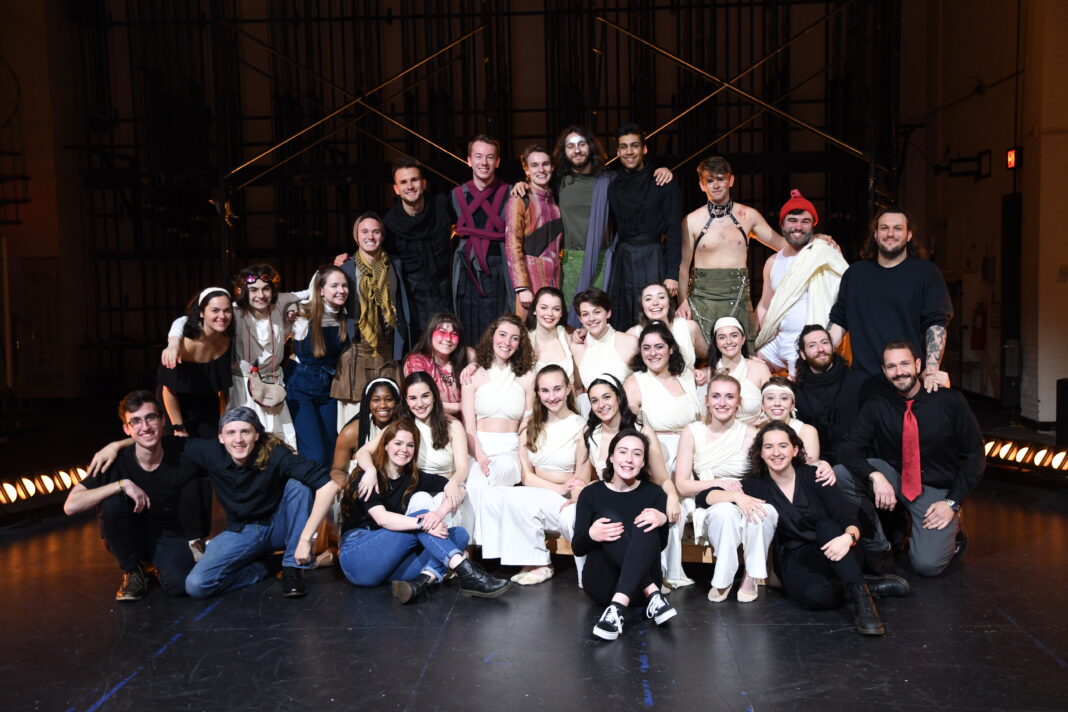Lara Atry ‘20 – a senior theatre and media and communication student at Muhlenberg College – was attending her first designer run-through of a Muhlenberg mainstage theatre and dance production called The Bacchae.
The actors attending this session in early March had been rehearsing for several weeks preceding their spring break and were finally off-book for their first full run-through of the show. Just as they completed their energizing warm-up and cast members were running to get water, one student shouted: “They’re sending us home.”
“I remember there was a panic in the room,” recalls Atry, “[a] stiff silence, but then tons of questions flying around. People were sobbing, worried about how they were going to afford to get home, among a million other worries. A lot of cast members were crying, and I remember Caden [Fraser ‘20] saying, ‘This really…sucks. We worked so hard on this show and all for nothing.’ As a senior, I really felt that sentiment.”
There are many reasons why moving to remote learning has been challenging for different students. Theatre and arts students, however, have an added level of difficulty when shifting to an online forum. Muhlenberg College is widely recognized for its focus on the arts, especially within the theatre and dance department. Every student involved in the major attends on-campus events, the small size of the department allows for a closeness that might be lost in larger majors, and the mainstage productions that the College has presented are nothing short of astounding.
When classes were moved to an online forum due to the sudden presence of COVID-19 in the United States, it created very specific challenges for theatre students who rely on performing, coaching and being present in interactive settings.
“My professors have really been willing to listen to us,” says theatre student Valentina Nazzaro ‘22, “but […] ever since the shift of moving online, I’ve kind of lost that passion that I feel at school.”
Professors and department heads have been working extremely hard to maintain some type of arts education even through remote learning. As Nazzaro mentions, they have been open to listening to students and frequently using platforms like Zoom to maintain interactive contact. In certain theatre classes, students are being taught new approaches to making self-taped monologues and being given access to more online theatre than ever before.
Large theatre associations like Shakespeare in the Park, BroadwayHD and the National Theatre have been releasing filmed productions that are now being used to observe acting methods and discuss scripts. There has never been a wider range of attainable theatre on an online forum.
Despite these efforts, Nazzaro is not alone in feeling lost or less passionate during these times. Madison Jaffe-Richter ‘22, theatre major, dance minor and former member of The Bacchae cast, expressed her frustration at the prospect of switching classes to remote learning.
“I was devastated,” says Jaffe-Richter. “As someone who had already taken a semester off freshman year and having finally felt comfortable at school, having to come back home was really sad. I found my new home in PA and I didn’t want to leave.”
The elements that make the arts speak to so many students get lost when moved to an online forum, say Muhlenberg students lost amid such uncertainty surrounding the arts and their place in education.
Students at other schools have similar worries. Alayna Bierly, who majors in environmental studies at Oberlin College, says that “Even having class on Zoom with everyone there synchronously is not the same at all.”
Despite the clear frustrations that every single one of these students is facing during these unfortunate circumstances, students interviewed agree that it is necessary to continue finding ways to improve and enhance arts education through any means possible.
“It would definitely take a lot more effort to figure out the best way to go about it,” says Bierly, “[but] I can just imagine if our entire learning experience was just based on writing papers or listening to lectures … that’s just not stimulating at all. You need diversity in learning.”
Similarly, Nazzaro states that “especially during this time, arts education is so powerful and so purposeful … We are all scared, and I think that through the arts people are finally finding some hope … and it just brings people together.”
Based on a recent study conducted by the Brookings Institution before the outbreak of COVID-19, “a substantial increase in arts educational experiences has remarkable impacts on students’ academic, social, and emotional outcomes.” The study shows a “3.6 percentage point reduction in disciplinary infractions, an improvement of 13 percent of a standard deviation in standardized writing scores, and an increase of 8 percent of a standard deviation in their compassion for others.”
Before moving to remote learning, the Muhlenberg College theatre and dance department decided to hold an open dress rehearsal of The Bacchae to showcase all the work and effort of the cast and crew. The performance welcomed a full audience and reminded everyone of the importance of the arts in times of stress and uncertainty.
“I remember getting chills hearing the audience scream for us. It felt like a rock concert; it was absolutely unreal,” Atry recalls, “I was so happy to see some of my best friends that I have grown through the department with make their final appearance on the Muhlenberg stage … I remember hearing the audience scream for me, which was crazy! I seriously felt like a rock star! But I blacked out for most of the performance, but I was just so happy that the show was happening.”
In a final moment of reflection, Atry shares the emotional vulnerability she felt at her final performance and still feels now. “We were all scared and were all still scared,” she says, “but we were reminded that as humans, we are built to persevere and keep telling those stories.”






















